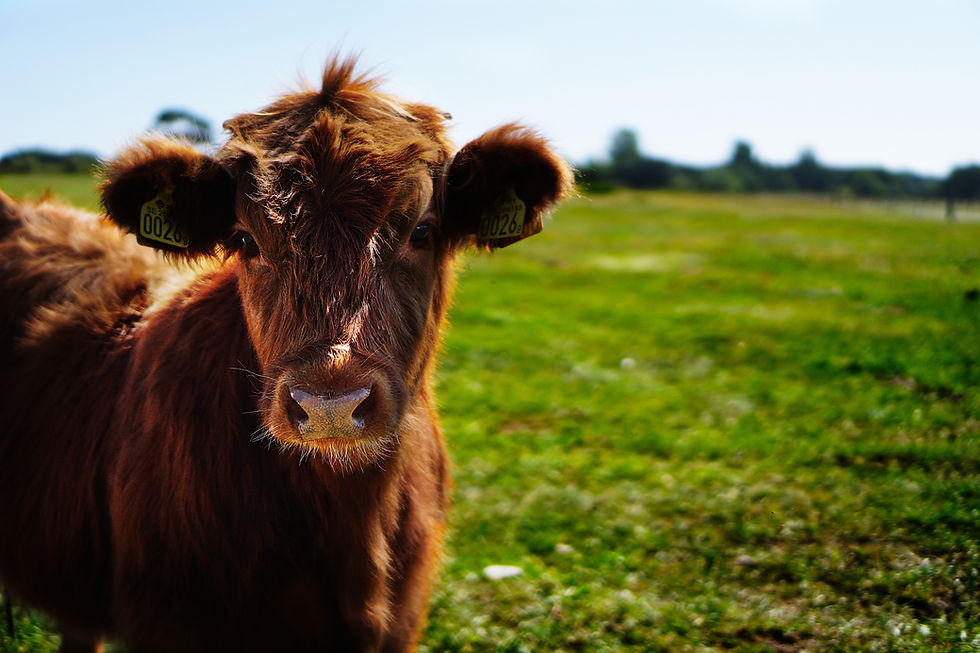Fliegen lernen
- Aurelia Pangolini

- 10. Nov. 2021
- 4 Min. Lesezeit
So hübsch ist diese Landschaft, die Seen und Berge, die bunt und unregelmäßig gefärbten Blätter der Ahorn-, Linden- und Eichenbäume. Aber überall sieht man eingesperrte Tiere, Kühe, Hühner, Schafe, Ziegen und Pferde. Sie verbringen ihr gesamtes Leben unschuldig in Haft. Auch wenn einige einen großen, umzäunten Auslauf haben. Oder sogar auf Almen den Sommer verbringen. Viele Kühe haben den schönen und zynischen Ausblick auf die Freiheit und die Wiesen und Felder vom Stall aus.
Manche Kühe, die Glück haben, dürfen auf einer Wiese herumlaufen und haben sogar ihre Kälber dabei. Andere erleben dies nicht, sie werden zum gebuchten Schlachttermin von ihren bisherigen Versorgern verraten und endlich zu dem, wozu sie von vornherein bestimmt sind: Sie heißen „Weiderind“.
Okapi: - Ich habe heute das Unsagbare gesehen. Das was ich nie sehen will, obwohl ich weiss dass es angeblich „normal“ ist. Und dauernd passiert.
Zebra fragt: - Meinst Du den Anhänger mit schweren Gittern?
Okapi nickt und flüstert leise: - Und es waren die kuscheligen jungen Kühe drinnen. Sie haben rausgeschaut und nicht verstanden was passiert.
Zebra summt eine Melodie und singt dann:
On a waggon bound for market there’s a calf with a mournful eye
high above him there’s a swallow winging swiftly through the sky
(….) Stop complaining! said the farmer. Who told you a calf to be?
Why don't you have wings to fly with, like the swallow so proud and free?
- Klassischer Fall von Victim-Blaming: das Opfer ist selbst schuld, sagt Okapi. - Eine Argumentation alter Schule. Paßt auch zu Kolonialismus und Sexismus. Ich habe neulich so einen dummen Beitrag über einen super bekannten internationalen Kochstar gehört. Er hat mich derart erzürnt, dass ich abgedreht habe, schnaubt Okapi, noch immer spürbar verärgert.
- Was war das spezielle Ärgernis? will Zebra wissen.
- Auf welche Art von Kultur bezieht man sich, wenn eine gelungene Speisezubereitung immer den gewaltsamen Tod von Lebewesen voraussetzt? Macht die Übereinkunft, Grausamkeit und Ungerechtigkeit zu vertuschen, oder sogar als normalen Alltagsbestandteil zu akzeptieren, das Verständnis geteilter Kultur aus?
- Ich glaube, es gibt so eine langanhaltende Idee, dass es ein Opfer braucht, um zu Genuss zu kommen.
Die Perspektive erhellt sich mit dem Wissen, dass man das jeden Tag ändern kann. Ein Glück! Man muß keine Gans zu Martini essen, keinen Truthahn zu Thanksgiving und keine Ente zu Weihnachten.
Durch Entscheidungen trägt man – bewußt oder unbewußt - jeden Tag zur Gestaltung der Welt bei.
In James Baldwin‘s präziser Formulierung: "Nicht alles, dem man sich stellt, kann man ändern. Aber nichts kann geändert werden, bis man sich ihm stellt.“

Learning to fly
So pretty is this landscape, the lakes and mountains, the colorful and irregularly colored leaves of the maple, linden and oak trees. But everywhere you see caged animals, cows, chickens, sheep, goats and horses. They spend their entire lives innocently imprisoned. Even if some have a large fenced run. Or even spend the summer on alpine pastures. Many cows have the beautiful and cynical view of freedom and meadows and fields from the barn.
Some cows that are lucky are allowed to run around in a meadow and even have their calves with them. Others do not experience this, they are betrayed by their previous providers at the booked slaughter date and finally become what they were destined to be in the first place: They are called "grazing cattle".
Okapi: - I have seen today the unspeakable. That which I never want to see, although I know that it is supposedly "normal". And happens all the time.
Zebra asks: - Do you mean the trailer with heavy bars?
Okapi nods and whispers softly: And it was the cuddly young cows inside. They looked out and didn't understand what was happening.
Zebra hums a tune and then sings:
-On a waggon bound for market there's a calf with a mournful eye
high above him there's a swallow winging swiftly through the sky
(....) Stop complaining! said the farmer. Who told you a calf to be?
Why don't you have wings to fly with, like the swallow so proud and free?
-Classic case of blaming the victim: it's the victim's own fault, says Okapi with a furrowed brow. -An old-school argumentation. Fits colonialism and sexism too. I heard such a stupid program the other day about a super famous international cooking star. It angered me so much that I turned off, snorts Okapi, still noticeably annoyed.
- What was the particular annoyance? Zebra wants to know.
- What kind of culture are you referring to when successful food preparation always requires the violent death of living creatures? Does the agreement to cover up cruelty and injustice, or even to accept it as a normal part of everyday life, constitute an understanding of shared culture?
- I think there's such a long-held idea that it takes a sacrifice to get pleasure.
The perspective brightens with the knowledge that you can change it every day! A happiness! You don't have to eat a goose for Martini, a turkey for Thanksgiving, or a duck for Christmas.
By making choices, you contribute - consciously or unconsciously - to shaping the world every day.
As James Baldwin’s famously wrote: “Not everything that is faced can be changed. But nothing can be changed until it’s faced.”





Kommentare